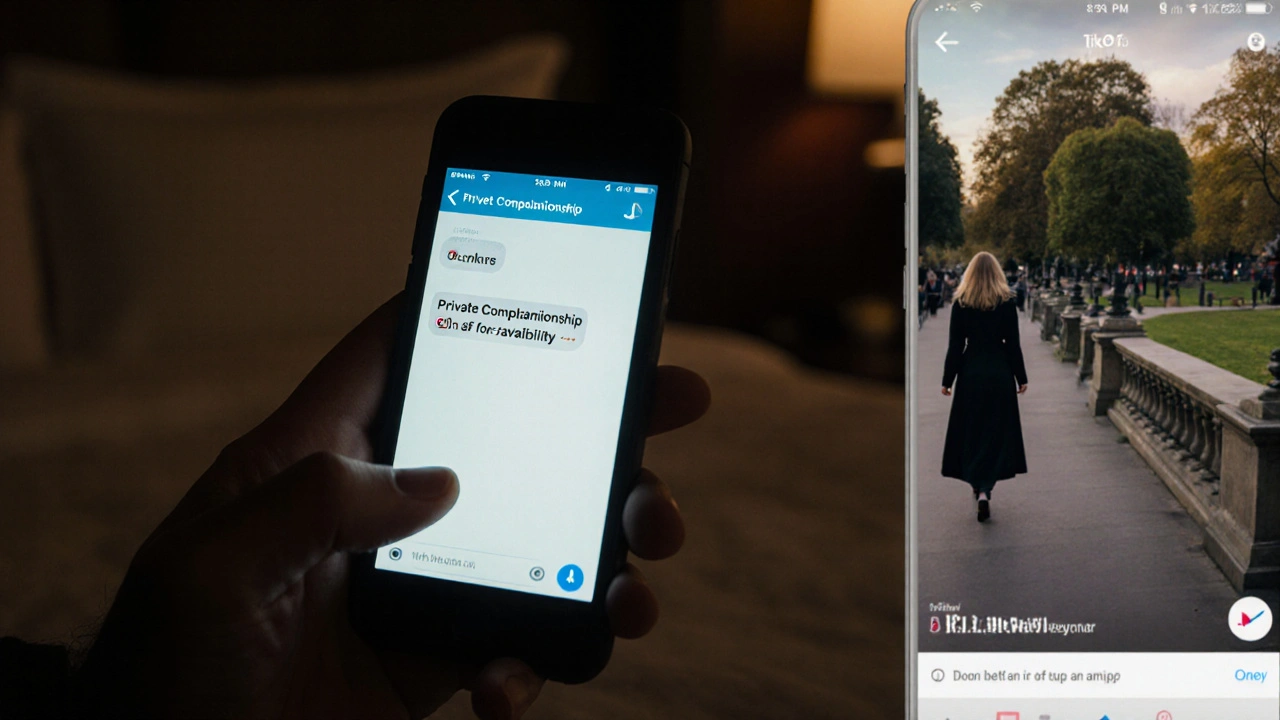
Adult Services October 31, 2025
How Social Media Changed the British Escort Industry in 2025
Five years ago, if you wanted to find an escort in London, you’d scroll through dusty classifieds, call a number off a flyer, or rely on word-of-mouth. Today, it’s all on Instagram, TikTok, and private Telegram channels. The British escort industry didn’t just adapt to social media-it was rebuilt by it. No more agency fees, no more rigid schedules, no more hiding. Now, independent escorts run their own businesses, set their own rates, and control their own image. And it’s changing everything.
From Classifieds to Feeds
Before 2018, most escorts in the UK relied on agencies or niche adult websites like AdultWork or Eros. Those platforms took 30-50% of earnings, required strict photo guidelines, and often demanded ID verification that exposed personal details. Now, the top 20% of earners in London don’t use any agency at all. They post curated photos on Instagram, share short videos on TikTok, and use Linktree to direct clients to their booking pages. One London-based escort I spoke with-let’s call her Leah-says she made £85,000 last year with zero agency involvement. Her entire client base came from organic Instagram reach and repeat bookings from people who found her through a viral Reel.
The shift wasn’t just about convenience. It was about control. Escorts now decide what they show: a subtle hint of lingerie, a coffee date photo, a quote about independence. They don’t need to fit a "standard" look anymore. Curvy, tattooed, older, non-binary-clients are seeking authenticity, not clichés. And social media lets them show exactly who they are.
The Algorithm Doesn’t Care About Morality
Platforms like Instagram and TikTok still ban explicit content. But they don’t ban suggestion. A photo of a woman in a silk robe, sipping champagne in a luxury flat? That’s fine. A caption like "Private evenings in Mayfair-DM for details"? That’s a gray zone. And the algorithm doesn’t care. It sees engagement-likes, saves, shares-and pushes it further. That’s how many escorts grow their audience without ever posting anything illegal.
One study from the University of Brighton in 2024 tracked 1,200 UK-based escort profiles across platforms. It found that accounts using lifestyle content-travel, fashion, wellness-grew 3x faster than those posting overtly sexual images. The most successful accounts blended professionalism with personal branding. They didn’t sell sex. They sold an experience: privacy, discretion, emotional connection. And that’s what clients are paying for.
How Clients Find Them Now
It’s not about search engines anymore. It’s about hashtags and location tags. #LondonEscort, #PrivateLondonDate, #HighEndLondonCompanion-these aren’t just tags. They’re digital storefronts. Clients don’t type "escort London" into Google. They scroll through Instagram Explore, follow influencers who mention "safe dates," and click on bios that say "DM for availability."
Some escorts even use geotags on public spots-St. James’s Park, The Shard rooftop bar, a boutique hotel lobby-to attract people who are already in the area. One escort in Brighton told me she gets 3-4 bookings a week from people who saw her post at the Brighton Pier and thought, "That’s exactly what I need tonight."
Private messaging apps like Telegram and Signal have become the new booking systems. No public comments. No traceable records. Just encrypted chats, bank transfers via Revolut or Wise, and confirmation codes sent as voice notes. It’s faster, safer, and harder for authorities to track.

Who’s Making Money-and Who’s Not
Not everyone wins. The market is saturated. Thousands of people are posting the same filtered photos, the same "I’m just a girl who likes to travel" captions. The ones thriving are the ones treating it like a real business.
Top earners invest in:
- Professional lighting and editing (not phone filters)
- Consistent posting schedules (3-4 times a week)
- Clear pricing on their Linktree (no guessing games)
- Client screening questions in DMs ("What are you looking for tonight?" before sharing contact info)
- Legal advice on contracts and tax (yes, they pay income tax)
Those who treat it like a side hustle-posting once a month, using amateur photos, ignoring safety-get ignored. Or worse, scammed. There’s been a 40% rise in fake client scams in the UK since 2023, mostly targeting new escorts who don’t screen properly.
The Hidden Risks
Yes, social media gives freedom. But it also brings new dangers.
Doxxing is real. A client who gets rejected might post screenshots of private messages on Reddit. A jealous ex might share location data. One escort in Manchester lost her job, her apartment, and her family’s trust after a single viral post linked her real name to her profile.
Platform bans are sudden. Instagram can delete an account overnight with no warning. No appeal. No explanation. One woman in Leeds lost 12,000 followers in 24 hours after a single photo was flagged by an automated system. She had to rebuild everything from scratch.
And then there’s the legal gray area. While sex work itself isn’t illegal in the UK, advertising it is. The Policing and Crime Act 2009 makes it an offense to "solicit in a public place"-and social media posts can be interpreted as solicitation. The Crown Prosecution Service has started using social media evidence in investigations. In 2024, three escorts in London received warning letters after police reviewed their public profiles.

The Future Is Personal Branding
The old model-agency-run, impersonal, transactional-is fading. The new model is personal, digital, and intentional. The most successful escorts now call themselves "independent companions," "intimate experience providers," or "discreet hosts." They avoid the word "escort" in public posts. They focus on storytelling, not seduction.
Some are even branching out. One London-based escort started a podcast about mental health for sex workers. Another launched a small skincare line for people who work late nights. A third teaches online courses on "digital safety for independent professionals."
This isn’t just about making money anymore. It’s about building a life on your own terms. Social media didn’t create the British escort industry. But it gave those inside it a voice, a platform, and a way to redefine what it means to work for yourself.
What Clients Really Want Now
It’s not just sex. It’s connection. Validation. A break from routine. A quiet evening without judgment.
One client I spoke with-Mark, 42, a tech manager in Canary Wharf-said he’s been seeing the same escort for 18 months. "It’s not about the physical part," he told me. "It’s about being heard. She remembers my coffee order, asks about my mom’s surgery, and never pressures me. That’s worth more than any app rating."
That’s the real shift. Clients aren’t looking for a service. They’re looking for a person. And social media lets escorts show who they are-before, during, and after the appointment.
Is it legal to advertise as an escort on social media in the UK?
Advertising sex work is illegal under the Policing and Crime Act 2009. While offering companionship isn’t against the law, using phrases like "DM for services," "private meetings," or "discreet dates" in public posts can be interpreted as solicitation. Many escorts avoid the word "escort" entirely and use vague terms like "companion" or "experience provider." They rely on private messaging to confirm details. Enforcement is inconsistent, but police have started using social media to build cases. It’s a gray area-and one that carries real risk.
How do escorts avoid getting banned on Instagram and TikTok?
Top earners avoid anything that looks like explicit content: no nudity, no suggestive poses, no direct mentions of sex. Instead, they use lifestyle content-travel, fashion, coffee dates, art galleries, yoga. They post captions that hint, not state. "Feeling luxurious today," or "London nights are better with good company." They use private channels like Telegram for bookings. Platforms don’t ban for implication-they ban for clear violations. The best accounts look like influencers, not ads.
Do escorts pay taxes in the UK?
Yes, legally they should. Income from escorting is taxable under UK law. Many independent escorts register as sole traders with HMRC and file annual self-assessment returns. Some use accounting software like QuickBooks or Xero to track income and expenses-travel, clothing, phone bills, editing software. While enforcement is rare, HMRC has begun targeting high-earning digital workers. Those who don’t declare income risk penalties, back taxes, and even criminal charges for tax evasion.
What’s the average income for an independent escort in London today?
There’s no official data, but surveys from UK sex worker advocacy groups in 2024 suggest a wide range. Entry-level workers make £30-£60 per hour. Mid-tier workers with a strong online presence earn £80-£150/hour. Top earners-those with 10,000+ followers, professional branding, and repeat clients-can make £200-£500/hour. Annual income for the top 10% exceeds £100,000. Most work 10-15 hours a week.
Are agencies still relevant in 2025?
For most, no. Agencies still exist, especially for high-end clients who want vetted profiles or corporate bookings. But they’re shrinking. The average agency takes 40-60% of earnings, imposes strict rules, and often requires escorts to work set hours. Independent workers keep 100% of their income, set their own pace, and control their image. Most new entrants skip agencies entirely. The few agencies that survive now act more like PR firms-helping escorts build their brand, not control their schedule.
Final Thoughts
Social media didn’t create the British escort industry. But it changed its DNA. It turned a hidden trade into a digital profession. It gave power back to the people who do the work. And it forced society to see sex workers not as criminals or victims-but as entrepreneurs.
The risks are real. The scrutiny is growing. But for those who treat it like a business-carefully, safely, professionally-the rewards have never been higher.





